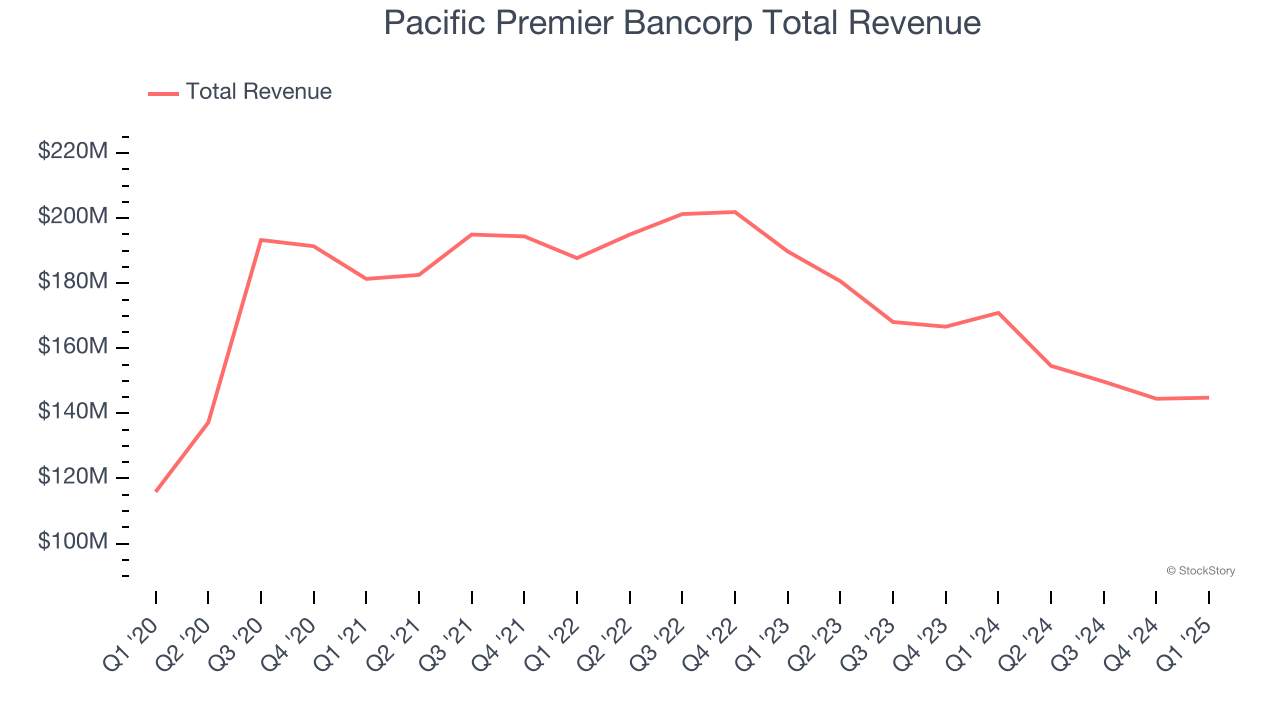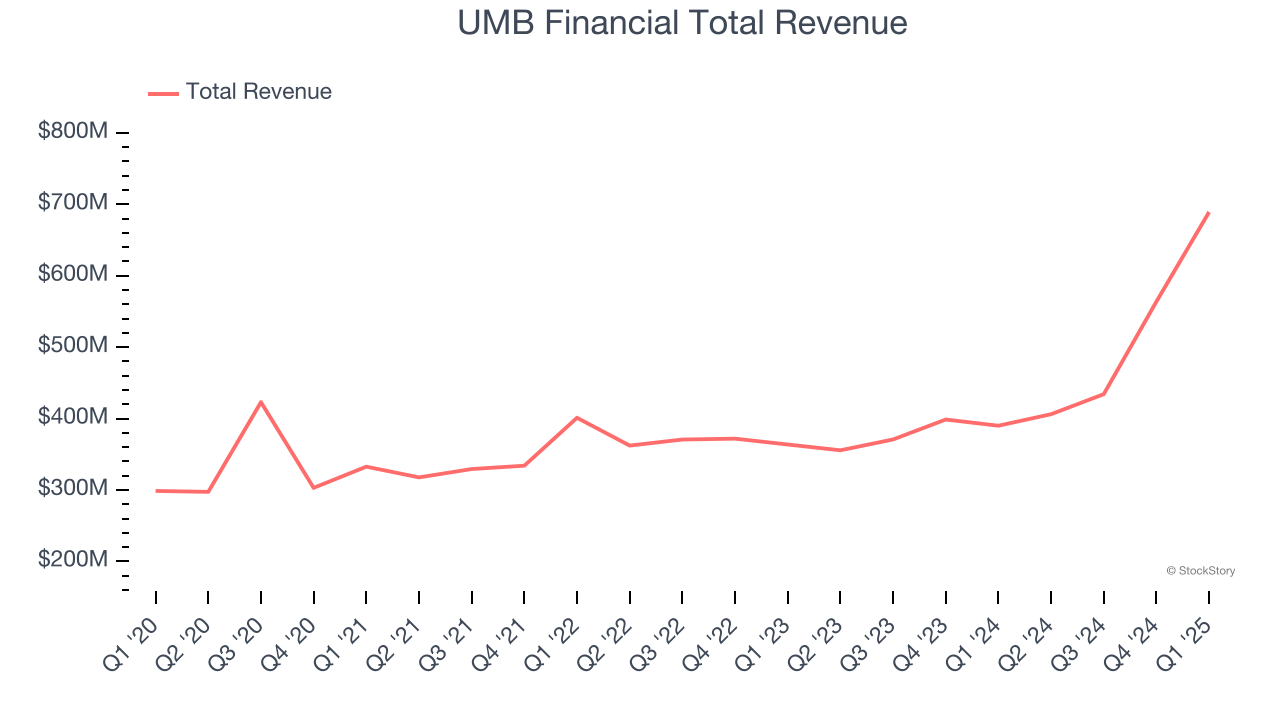
Quarterly earnings results are a good time to check in on a company’s progress, especially compared to its peers in the same sector. Today we are looking at Pacific Premier Bancorp (NASDAQ: PPBI) and the best and worst performers in the regional banks industry.
Regional banks, financial institutions operating within specific geographic areas, serve as intermediaries between local depositors and borrowers. They benefit from rising interest rates that improve net interest margins (the difference between loan yields and deposit costs), digital transformation reducing operational expenses, and local economic growth driving loan demand. However, these banks face headwinds from fintech competition, deposit outflows to higher-yielding alternatives, credit deterioration (increasing loan defaults) during economic slowdowns, and regulatory compliance costs. Recent concerns about regional bank stability following high-profile failures and significant commercial real estate exposure present additional challenges.
The 103 regional banks stocks we track reported a satisfactory Q1. As a group, revenues beat analysts’ consensus estimates by 0.5%.
Thankfully, share prices of the companies have been resilient as they are up 5.2% on average since the latest earnings results.
Pacific Premier Bancorp (NASDAQ: PPBI)
With a specialized division that serves homeowners' associations nationwide and a trust division that handles self-directed IRAs with alternative assets, Pacific Premier Bancorp (NASDAQ: PPBI) is a Western US regional bank that provides banking services to small and middle-market businesses, corporations, non-profits, and specialty markets.
Pacific Premier Bancorp reported revenues of $144.8 million, down 15.3% year on year. This print exceeded analysts’ expectations by 1.2%. Overall, it was a very strong quarter for the company with a beat of analysts’ EPS estimates and net interest income in line with analysts’ estimates.
Steven R. Gardner, Chairman, Chief Executive Officer, and President of the Company, commented, “We delivered strong financial results in the first quarter, generating net income of $36.0 million, or $0.37 per share. These results demonstrate our ability to build on the momentum established in the second half of 2024, reflecting non-interest income growth and lower operating expenses. Notably, the cost of funds decreased 14 bps from the prior quarter to 1.74%, driving a four-basis point expansion in our net interest margin to 3.06%. Additionally, we maintained our strong capital levels, with our tier 1 common equity ratio at 16.99% and our total risk-based capital ratio at 20.23%, placing us among the top of our peers.

Interestingly, the stock is up 9.3% since reporting and currently trades at $24.57.
Is now the time to buy Pacific Premier Bancorp? Access our full analysis of the earnings results here, it’s free.
Best Q1: UMB Financial (NASDAQ: UMBF)
With roots dating back to 1913 and a name derived from "United Missouri Bank," UMB Financial (NASDAQ: UMBF) is a financial holding company that provides banking, asset management, and fund services to commercial, institutional, and individual customers.
UMB Financial reported revenues of $689.2 million, up 76.7% year on year, outperforming analysts’ expectations by 8.6%. The business had a stunning quarter with a beat of analysts’ EPS estimates and a solid beat of analysts’ tangible book value per share estimates.

The market seems happy with the results as the stock is up 13.3% since reporting. It currently trades at $124.33.
Is now the time to buy UMB Financial? Access our full analysis of the earnings results here, it’s free.
Weakest Q1: Coastal Financial (NASDAQ: CCB)
Pioneering the intersection of traditional banking and financial technology in the Pacific Northwest, Coastal Financial (NASDAQ: CCB) operates as a bank holding company that provides traditional banking services and Banking-as-a-Service (BaaS) solutions to consumers and businesses.
Coastal Financial reported revenues of $119.4 million, down 11.7% year on year, falling short of analysts’ expectations by 21.5%. It was a disappointing quarter as it posted a significant miss of analysts’ net interest income estimates and a significant miss of analysts’ EPS estimates.
Interestingly, the stock is up 12.9% since the results and currently trades at $114.50.
Read our full analysis of Coastal Financial’s results here.
Atlantic Union Bankshares (NYSE: AUB)
Tracing its roots back to 1902 when it first opened its doors in Virginia, Atlantic Union Bankshares (NYSE: AUB) is a full-service regional bank providing commercial and retail banking, wealth management, and insurance services throughout Virginia and parts of Maryland and North Carolina.
Atlantic Union Bankshares reported revenues of $402.9 million, up 84.2% year on year. This result beat analysts’ expectations by 11.3%. Overall, it was an exceptional quarter as it also put up a solid beat of analysts’ tangible book value per share estimates and a beat of analysts’ EPS estimates.
The stock is up 6.1% since reporting and currently trades at $35.73.
Read our full, actionable report on Atlantic Union Bankshares here, it’s free.
Stellar Bancorp (NYSE: STEL)
Created through strategic mergers to serve the growing Texas business community, Stellar Bancorp (NYSE: STEL) is a Texas bank holding company that provides commercial banking services primarily to small and medium-sized businesses and professionals.
Stellar Bancorp reported revenues of $104.1 million, down 2.5% year on year. This print came in 0.8% below analysts' expectations. More broadly, it was a mixed quarter as it also produced a beat of analysts’ EPS estimates but a slight miss of analysts’ net interest income estimates.
The stock is down 2.1% since reporting and currently trades at $30.92.
Read our full, actionable report on Stellar Bancorp here, it’s free.
Market Update
In response to the Fed’s rate hikes in 2022 and 2023, inflation has been gradually trending down from its post-pandemic peak, trending closer to the Fed’s 2% target. Despite higher borrowing costs, the economy has avoided flashing recessionary signals. This is the much-desired soft landing that many investors hoped for. The recent rate cuts (0.5% in September and 0.25% in November 2024) have bolstered the stock market, making 2024 a strong year for equities. Donald Trump’s presidential win in November sparked additional market gains, sending indices to record highs in the days following his victory. However, debates continue over possible tariffs and corporate tax adjustments, raising questions about economic stability in 2025.
Want to invest in winners with rock-solid fundamentals? Check out our Top 5 Growth Stocks and add them to your watchlist. These companies are poised for growth regardless of the political or macroeconomic climate.
StockStory is growing and hiring equity analyst and marketing roles. Are you a 0 to 1 builder passionate about the markets and AI? See the open roles here.





